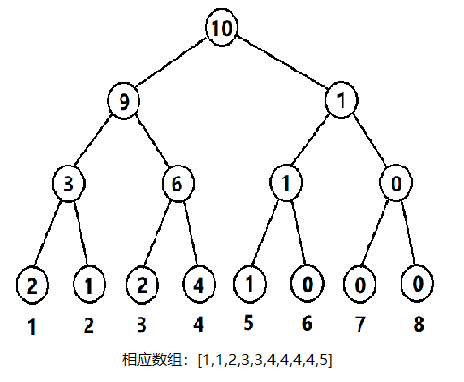数据结构-权值线段树
概述
权值线段树 属于一种特殊的线段树。普通线段树基于元素个数开辟节点空间,节点之内维护特定信息 (例如,区间最大值、区间最小值),权值线段树则基于元素值域开辟节点空间,节点之内维护当前区间内的元素个数。
其结构图大致如下:

由于节点维护当前区间内的元素个数,故而权值线段树可以 $O(log^N)$ 时间查找整个区间内第 $K$ 大/小元素。
权值线段树具有一个非常重要的性质:假定所有元素按序尾部插入到数组之中,那么数组 $[0,R]$ 对应的权值线段树减去数组 $[0,L-1]$ 对应的权值线段树就是数组 $[L,R]$ 对应的权值线段树。如果保存以往的权值线段树,那么就可以在 $log^N$ 时间复杂度内实现查询任意指定区间 $[L,R]$ 内的第 $K$ 大/小元素,这也是主席树的基本思想。
- 如果了解桶排序,容易知道:权值线段树维护的是桶信息。
结构
在 数据结构-线段树 中,我们直接使用数组实现线段树。这里采用一种不同的写法,我们选用静态链表进行实现。另外我们直接指定元素类型为 int 。
1 | class WeightSegmentTree { |
实现
辅助方法
构建权值线段树
以
root为根节点、所负责区间为 $[l,r]$ 的子树基于含有元素个数信息的sum进行构建权值线段树。1
2
3
4
5
6
7
8
9
10
11
12
13
14
15
16
17
18
19
20
21private void build(int root, int l, int r, HashMap<Integer, Integer> sum) {
// 区间内仅有一个值,则赋值sum中该值对应的个数,如果没有就赋值为0。
if (l == r) {
this.tree[root] = sum.containsKey(l) ? sum.get(l) : 0;
return ;
}
// 获取中间位置。
int mid = (l + r ) >> 1;
// 基于nodeCount构建左右儿子节点。
this.left[root] = ++nodeCount;
this.right[root] = ++nodeCount;
// 递归构建左右子树。
build(this.left[root], l, mid, sum);
build(this.right[root], mid + 1, r, sum);
// 更新根节点值。
this.tree[root] = this.tree[this.left[root]] + this.tree[this.right[root]];
}当前子树内查询第 $K$ 小元素 ($K \in[0,\infty)$)
1
2
3
4
5
6
7
8
9
10
11
12
13
14
15
16
17
18
19private int getKthTree(int root, int l, int r, int k) {
// 当前子树所负责区域仅有一个值,如果对应元素个数大于k,则返回该元素,否则表明不存在,直接返回一个负数。
if (l == r) {
return (this.tree[root] > k) ? l : -WeightSegmentTree.Bound;
}
// 获取中间位置。
int mid = (l + r) >> 1;
// 获取左子树所负责区间中的元素个数
int x = this.tree[this.left[root]];
// x>k,表明第k小元素在左子树之中,故而应在左子树中进行查询;否则在右子树中进行查询。
if (x > k) {
return getKthTree(this.left[root], l, mid, k);
} else {
return getKthTree(this.right[root], mid + 1, r, k - x);
}
}第 $K$ 大元素代码与此类似,故不赘述。
当前子树插入/删除指定元素若干次
1
2
3
4
5
6
7
8
9
10
11
12
13
14
15
16
17
18
19
20private void update(int root, int l, int r, int num, int count) {
if (l == r) {
// 如果更新有效,则更新,否则不更新。
this.tree[root] = (this.tree[root] + count >= 0) ? this.tree[root] + count : this.tree[root];
return ;
}
// 获取中间位置。
int mid = (l + r) >> 1;
// 根据中间位置判断指定元素位于何处。如果位于左子树,则在左子树中更新,否则在右子树中更新。
if (mid >= num) {
update(this.left[root], l, mid, num ,count);
} else {
update(this.right[root], l, mid, num ,count);
}
// 更新根节点值。
this.tree[root] = this.tree[this.left[root]] + this.tree[this.right[root]];
}初始化
1 | public WeightSegmentTree(int[] arr) { |
查询
相关文章